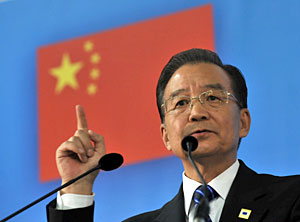 |
Rarely does Nepal get the chance to shine on the world stage, and even when it does, it makes a mess of things. The postponement of Chinese Prime Minister Wen Jiabao's visit to Nepal has tarnished Nepal's reputation further. Amid preparations for Premier Wen's visit, the cancellation announcement has left the government red faced. Sources in government blame political parties who didn't want the Bhattarai-led government to get credit for the visit and detested the growing friendliness between China and Nepal. When the Madhesi Front threatened to walk out of the coalition government the Chinese side was told this may not be the right time to do deals with an unstable government. Although it is difficult to prove it, this is probably the main cause. At a time when efforts need to be concentrated on constitution drafting and concluding the peace process, such rifts between the parties is unnecessary. Nepal has been the playground of foreign countries, and our leaders have time and again proved to be short-sighted. It's high time they did something to restore our ailing international reputation.
Yubraj Ghimire in Jana Aastha, 14 December
The Chinese premier's postponed state visit has raised many questions over Nepal�"China relationships.� Did the Chinese pull out at the last minute because they were wary of dealing with the Maoist-led government? It is no secret that the Chinese never accepted Nepali Maoists as true followers of Mao Zedong. What's more, Beijing is known to be unhappy over India's influence on Maoist leaders, particularly Dahal and Bhattarai. We may never find out the actual cause, but cancellation of Wen's visit means that Nepal has lost out on lucrative development packages.
Ghatana ra Bichar Weekly, 14-20 December
The cancellation of a supposedly very important visit by Chinese Premier Wen Jiaobao this week has raised serious questions about the credibility and competence of Prime Minister Baburam Bhattarai. Wen was going to announce major investment and aid worth billions and sign a BIPPA agreement with Nepal. The government itself was publicising all the goodies we were going to get:� a new international airport in Pokhara, the West Seti project, railways and the modernisation of Nepal Police. Ordinary Nepalis were bemused to see everything that was supposed to happen, and experts said this signified the added importance China had given to relations with Nepal. Still others said a new� 'cold war'� had started between India and China. The cancellation of such a visit has shocked Nepali officialdom, and has ruined the persona of Prime Minister Bhattarai.� It is clear now that it was also the behaviour of Home Minister Bijay Gachhedar that had made the Chinese suspicious. The Chinese had hinted that they were not getting the necessary cooperation from Gachhedar about security matters during the visit.� Bhattarai has therefore lost a golden opportunity to show his equidistance between India and China, and also his image as a result-oriented prime minister who delivered on promises.� Now, it looks like Wen Jiabao is unlikely to visit Nepal as long as Bhattarai is prime minister.
Editorial in Annapurna Post, 14 December
The postponement of Chinese premier Wen Jiabao's visit is a diplomatic disaster and it has tarnished Nepal's image in the international arena.
The visit should have been treated with high level of sensitivity.� But instead PM Bhattarai prematurely disclosed the date and failed to respect silent diplomacy that the Chinese greatly value.
Like Bhattarai, many Nepali leaders in the past have demonstrated their incompetence in diplomacy.� And their lack of diplomatic skills becomes most pronounced when trying to strike a balance between two giant neighbours and win their confidence.
It's time Nepali leaders examined their diplomatic aptitude. They must learn to keep emotions and ideologies out of diplomacy and work on understanding the foreign policy, and internalising norms and practices of the concerned country.
Editorial in Kantipur, 15 December
The news that Chinese premier Wen Jiabao will no longer be visiting Nepal has sent shock waves throughout the nation and� political experts and analysts are all scampering to get to the root of the disaster.� PM Bhattarai flouted diplomatic norms by making a unilateral announcement of the definite date played a part in suspending the visit.� But news of Tibetan refugees holding protests in Kathmandu was what upset the Chinese the most.� China could not trust a country that made a mess by revealing confidential information and one that cannot curb protests with the security of its head of government.� The lack of coordination between the PM's Office and the Ministry of Foreign Affairs also did not help Nepal's cause.� Speculation will continue for a long time, but the government has an obligation to explain to the public why a visit from a neighbouring country's prime minister was postponed so abruptly.
Read also:
When Wen?


